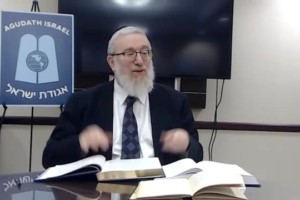Volatile Situation in Ukraine
State Department Official and Chief Rabbi of Ukraine Update Agudath Israel Leaders
 With the Russia-Ukraine crisis atop the minds of world leaders and citizens, Agudath Israel of America hosted a conference call focusing on the plight of the approximately 360,000 Jews currently residing in Ukraine. The call, held on Friday, April 4th, featured Ukrainian Chief Rabbi Yaakov Bleich and Ira N. Forman, the U.S. State Department’s Special Envoy to Monitor and Combat anti-Semitism, and was moderated by Rabbi Chaim Dovid Zwiebel, executive vice president of Agudath Israel of America.
With the Russia-Ukraine crisis atop the minds of world leaders and citizens, Agudath Israel of America hosted a conference call focusing on the plight of the approximately 360,000 Jews currently residing in Ukraine. The call, held on Friday, April 4th, featured Ukrainian Chief Rabbi Yaakov Bleich and Ira N. Forman, the U.S. State Department’s Special Envoy to Monitor and Combat anti-Semitism, and was moderated by Rabbi Chaim Dovid Zwiebel, executive vice president of Agudath Israel of America.
Rabbi Bleich offered a detailed, vivid portrayal of life in Ukraine, explaining that the country’s Jews are facing the greatest danger from anti-Semitism in at least 22 years. Since January, four serious anti-Semitic attacks took place in the heart of Jewish community life, in Kiev’s Podol neighborhood. All were clearly premeditated and professionally executed: A teacher and a shaliach were beaten, a bachur was stabbed, and a couple was followed by a mob on the way to shul, and miraculously escaped. The response from local police was very lackluster as well. “The community was very shaken up,” said Rabbi Bleich.
At the same time, Rabbi Bleich was blunt in his denunciation of the attempt by some powerful parties to use these incidents as a pretext for Russia’s incursions into Ukraine. He called this claim “cynical abuse,” and warned that it can carry serious repercussions for local Jews: It may inflame Ukrainians opposed to the Russian incursion against the Jews, and may prompt pro-Russian forces to stage anti-Semitic attacks in order to justify their position. “The Jewish community should not figure in this conflict,” he said.
He explained that while the Putin government is widely seen as being protective of the Russia’s Jews, the Ukrainian government has proven to also be very hospitable to local Jews’ spiritual growth. There are diverse, flourishing Orthodox communities in Kiev, Odessa, Lvov and other Ukrainian cities, with lots of Orthodox synagogues and educational institutions. Over 90% of self-identified Ukrainian Jews identify with Orthodoxy.
On the positive side, Rabbi Bleich pointed out that day-to-day Orthodox community life has remained virtually uninterrupted despite the past few months’ upheaval. During this school year, the day school in Kiev only canceled two days of class, when violence at the demonstrations in nearby streets was at its peak. He also discussed the strong relationship that he and other community leaders have built both with former President Viktor Yanukovych and the new government’s prime minister, Arseniy Yatsenyuk.
Rabbi Bleich personally met with Prime Minister Yatsenyuk three times since he took office in late February. Both the prime minister and leaders of other coalition factions offered strong public statements warning radical nationalists and others against anti-Semitic attacks. “Some members of the coalition – particularly Svoboda – have an anti-Semitic history, but they are quiet now,” Rabbi Bleich said.
For his part, Mr. Forman related that he and other U.S. government officials are keeping a very close eye on the situation in Ukraine, particularly on the welfare of the country’s Jewish community, and remain in constant contact with a variety of sources on the ground. Secretary of State John Kerry and other top State Department officials have visited the region on several recent occasions, and placed a significant focus on Jewish community affairs while there too.
Although there has been no evidence that the spate of recent anti-Semitic attacks were related to any government entity, Mr. Forman observed that their professionalism, common modus operandi, and the fact that they occurred in Kiev and not in nationalists’ strongholds, raise suspicion that there is more than meets the eye. Mr. Forman vowed that he and other U.S. diplomats will not in any way try to downplay anti-Semitism in Ukraine, and said that he refused to accept the insistence of some that there is nothing to worry about. “One needs to be blind to history not to be concerned (about anti-Semitism) when there is instability in Ukraine,” he said. “The region is called ‘bloodlands’ for very good reason.”
Rabbi Bleich stressed that in addition to the security dangers, Ukraine’s Jews have suffered immense economic woes in recent years. This has depleted much of the local funding base for community projects, whose costs have skyrocketed in light of the $30,000 a month it now spends for round-the-clock security. Rabbi Bleich praised Agudath Israel of America for its assistance in rallying the support of Jews around the world, and stressed the necessity of broad support for its “ma’os chitin” Overseas Passover Campaign for Pesach.
“On the one hand, the situation in Ukraine is frightening,” Rabbi Zwiebel summed up at the conclusion of the call, “but it is also reassuring that the U.S. government is being so helpful – and it is incumbent upon our community to do our part as well.”
(Author: Shimmy Blum)



